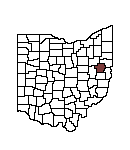County History as reported
in The Free Press Standard in 1933, page 6
County's Patriotic Namesake Was Distinguished Statesman
Editor's Note: -- This is the sixth and final installment of the annals of Carroll-co., complied by the late Peter M. Herold, It is reprinted from issue of January 23, 1884.
Thinking that a brief biography of those men who have figured so conspicuously in the county's history might be of interest to the readers of these annals, we subjoin a sketch of a few of those whose names have not been mentioned heretofore, and will commence with a short biography of our patriotic namesake, Charles Carroll of Carrollton.
Charles Carroll was descended from Irish ancestry. His grandfather, Daniel Carroll, was a native of Littemourna, in Ireland, and was a clerk in the office of Lord Powis, in the Reign of James II. Under the patronage of Lord Baltimore, the principal proprietor of Maryland, Mr. Carroll emigrated to that colony toward the close of the seventeenth century, and became the possessor of a large plantation. His son, Charles, the father of the subject of this memoir, was born in 1702, and lived to the age of eighty years, when he died and left his large estate to his eldest child, Charles, who was then twenty-five years old.
Charles Carroll, the Revolutionary patriot, was born on the twentieth of September, 1737. When he was only eight years of age, his father, who was a Roman Catholic, took him to France and entered him as a student in the Jesuit college at St. Omer's. there he remained six years and then went to another Jesuit seminary of learning at Rheims. After remaining there one year he entered the College of Louis le Grand, whence he graduated at the age of seventeen years, and then commenced the study of law at Bourges. He remained at Bourges one year and then moved to Paris where he continued until 1757. He then went to London for the purpose of continuing his law studies. He took apartments in the Inner Temple, where he remained until 1765, and then returned to Maryland, a most finished scholar and well-bred gentleman.
The passage of the Stamp Act, about the same time that he returned to America, arrested his attention and turned his mind more intently upon political affairs, of which he had not for some time been an indifferent spectator. He at once espoused the cause of the American patriots, and become associated with Chase, Paca, Stone and others in the various patriotic movements of the day. They become engaged in a newspaper war with the authorities of Maryland, and so powerful did these patriots wield the pen, that their discomfited opponents soon beat a retreat behind the prerogatives and power of the royal governor. Mr. Carroll was particularly distinguished as a political writer, and in 1771-72, his name, as such, became familiar in the other Colonies.
In 1772, he wrote a series of essays against the assumed right of the British government to tax the Colonies without their consent. The secretary of the Colony wrote in opposition to them, but Mr. Carroll triumphed most emphatically. His essays were signed "The First Citizen" and the name of the author was entirely unknown. But so grateful were the people for the noble defense of their cause which these papers contained, that they instructed the members of the Legislative Assembly of Maryland to return their hearty thanks to the unknown writer through public prints. This was done by William Paca, and Matthew Hammond. When it became known that Mr. Carroll was the writer, large numbers of people went to him and expressed their thanks personally, and he at once stood among the highest in popular confidence and favor.
Mr. Carroll early foresaw that a resort to arms in defense of Colonial rights was inevitable, and this opinion he fearlessly expressed. His decided character, his stern integrity and his clear judgment, made him an umpire in many momentous cases, and in every step he ascended higher and higher the scales of popular favor. He was appointed a member of the first Committee of Safety of Maryland, and in 1775 he was elected a member of the Provincial Assembly. His known sentiments in favor of independence were doubtless the cause of his not being sooner sent to the General Congress for, as we have already seen, the Maryland convention was opposed to that extreme measure.
Anxious to witness the men and their proceedings in the Continental Congress he visited Philadelphia for the purpose of early in 1776, and so favorable was he known there that Congress placed him on a committee with Doctor Franklin, and Samuel Chase, to visit Canada on an important mission. On his return, finding Mr. Lee's motion of independence before Congress, he hastened to Maryland to endeavor, if possible to have the restrictive instructions which governed her delegates in the National Assembly, removed. In this he was successful and when the prohibition was removed, he was elected a delegate to the Continental Congress with instructions to vote as the judgment of the delegates should indicate. Mr. Carroll proceeded to Philadelphia, where he arrived on the eighth of July, too late to vote for the Declaration of Independence, but in ample time to affix his signature to the parchment.
Ten days after he took his seat in Congress, Mr. Carroll was placed upon the Board of War, and continued a member of the same during his continuance in that body. He was at the same time a member of the Assembly of Maryland, and all the time which he could spare from his duties at Philadelphia, he spent in the active service of his own state. He was appointed in 1776 a member of the Convention that framed a Constitution for Maryland as an independent state, and after its adoption, he was chosen a member of the state senate.
Mr. Carroll continued a member of Congress until 1788, when he relinquished his seat and devoted himself to the interests of his native state. He was again elected to the senate of Maryland in 1781 and continued a member of that body until the adoption of the Federal Constitution. In December, 1788, he was elected a member of the first United States senate for Maryland. He remained there two years and in 1791 he was again elected to the senate of Maryland where he continued until 1801, when by the machinations of the strong party feeling of the day, he was defeated as a candidate for reelection. He then retired from public life, being sixty-four years of age, and he spent the remainder of his days amid the quiet pleasures of domestic retirement. He lived, honored and revered by the Republic with whose existence he was identified, until 1833, and was the last survivor of the fifty-six signers of the Declaration of Independence. He died at Baltimore on the 14th day of November, 1833, in the ninety-sixth year of his age.
The question naturally arises, why did Mr. Carroll append to his signature the place of his residence, "Carrollton?" It is said that when he wrote his name, a delegate near him suggested, that as he had a cousin of the name of Charles Carroll in Maryland, the latter might be taken for him, and he (the signer) escape attainder, or any other punishment that might fall upon the heads of the patriots. Mr. Carroll immediately seized the pen and wrote "of Carrollton," at the end of his name, exclaiming, "They cannot mistake me now!"
Gen. H. A. Stidger
Henry Andrew Stidger cast his lot and identified his interests with ours before the creation of this county. His whole life has been one continual round of business activity; whether in the mercantile business, or buying up produce and horses from the eastern and southern markets, he showed a tact peculiar to himself; and the improvements he had made by way of buildings and the like have been of a substantial character. Within the recollection of the writer, his return trips from new Orleans, where he was accustomed to raft a cargo of flour, etc., were always characterized by the purchase of a parrot, a monkey or something to interest the young, until his collection almost assumed the dimensions of a menagerie. We have already stated that this county was named in honor of Charles Carroll of Carrollton, Md., who, at the time of the formation of this county, was still living in Baltimore. In the spring of 1833, Gen. Stidger, whose custom it was in those early days to drive horses to Baltimore, called on the aged patriot and informed him of the honor his name had received by the naming of the new county. The old gentleman was highly pleased at the compliment and instructed the General to express his gratification to the perpetuation of his fame. Gen. Stidger still lives among us, to reflect over an eventful life, surrounded by friends who minister to the wants of his declining years.
"The Fighting McCooks"
The McCook family is so inseparably connected, not only with the history of Carroll-co, but with the nation at large, that these annals would be incomplete without some tribute to their memory. Eight brothers, in one capacity or another, through the war, served to make the name of McCook a dear one to all who loved the army and the country. They were all hard-hitting fighters, and three of them sealed their labors with blood -- Charles Morris McCook, private, Company F, Second Ohio, killed July 21, 1861 in the first battle of Bull Run; Brigadier-General Robert L. McCook, mortally wounded on his sick bed by guerillas in Tennessee August 2, 1862, and Brigadier-General Daniel McCook, mortally wounded at Kennesaw Mountain June 27, 1864. To the list may be added the father of these boys, Major Daniel McCook, mortally wounded at Buffington Island July 21, 1863. He was not in the service but had accompanied the cavalry as a volunteer. He was accorded a military funeral at Cincinnati, which was largely attended.
With this number of The Free Press we close the annals of Carroll-co. We are aware that we have not exhausted the subject and that abler minds than ours will supplement this matter long years after you and I, like streaks of morning cloud, shall have melted into the infinite azure of the past.



